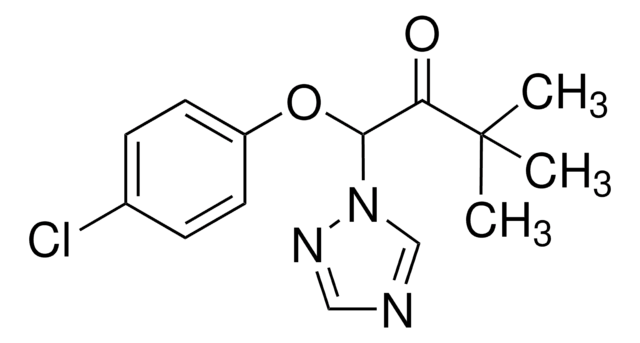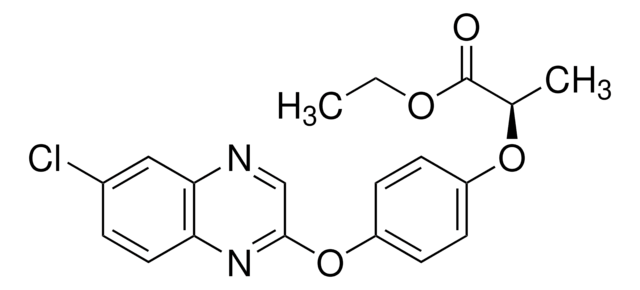46138
Triadimenol
PESTANAL®, analytical standard
Synonym(s):
α-tert-Butyl-β-(4-chlorophenoxy)-1H-1,2,4-triazole-1-ethanol
About This Item
Recommended Products
grade
analytical standard
Quality Level
description
mixture of diastereomers A and B
product line
PESTANAL®
shelf life
limited shelf life, expiry date on the label
technique(s)
HPLC: suitable
gas chromatography (GC): suitable
application(s)
agriculture
environmental
format
neat
SMILES string
CC(C)(C)C(O)C(Oc1ccc(Cl)cc1)n2cncn2
InChI
1S/C14H18ClN3O2/c1-14(2,3)12(19)13(18-9-16-8-17-18)20-11-6-4-10(15)5-7-11/h4-9,12-13,19H,1-3H3
InChI key
BAZVSMNPJJMILC-UHFFFAOYSA-N
Looking for similar products? Visit Product Comparison Guide
General description
Application
- Honey by supercritical fluid extraction (SFE) followed by capillary gas chromatography (GC) combined with electron-capture detection (ECD) as well as GC with mass spectrometry (MS) in selected ion monitoring mode (SIM).
- Cereals and dry animal feed by GC equipped with triple quadrupole tandem mass spectrometry (MS/MS).
- Plant foodstuffs by GC-ECD, GC with nitrogen phosphorus detector (NPD) and electron impact ionization (EI) GC-MS.
- Apple juice by matrix solid-phase dispersion (MSPD) with GC-MS detection.
Legal Information
Not finding the right product?
Try our Product Selector Tool.
Signal Word
Danger
Hazard Statements
Precautionary Statements
Hazard Classifications
Acute Tox. 4 Oral - Aquatic Chronic 2 - Lact. - Repr. 1B
Storage Class Code
6.1C - Combustible acute toxic Cat.3 / toxic compounds or compounds which causing chronic effects
WGK
WGK 2
Flash Point(F)
Not applicable
Flash Point(C)
Not applicable
Personal Protective Equipment
Choose from one of the most recent versions:
Certificates of Analysis (COA)
Don't see the Right Version?
If you require a particular version, you can look up a specific certificate by the Lot or Batch number.
Already Own This Product?
Find documentation for the products that you have recently purchased in the Document Library.
Chromatograms
application for HPLCOur team of scientists has experience in all areas of research including Life Science, Material Science, Chemical Synthesis, Chromatography, Analytical and many others.
Contact Technical Service











